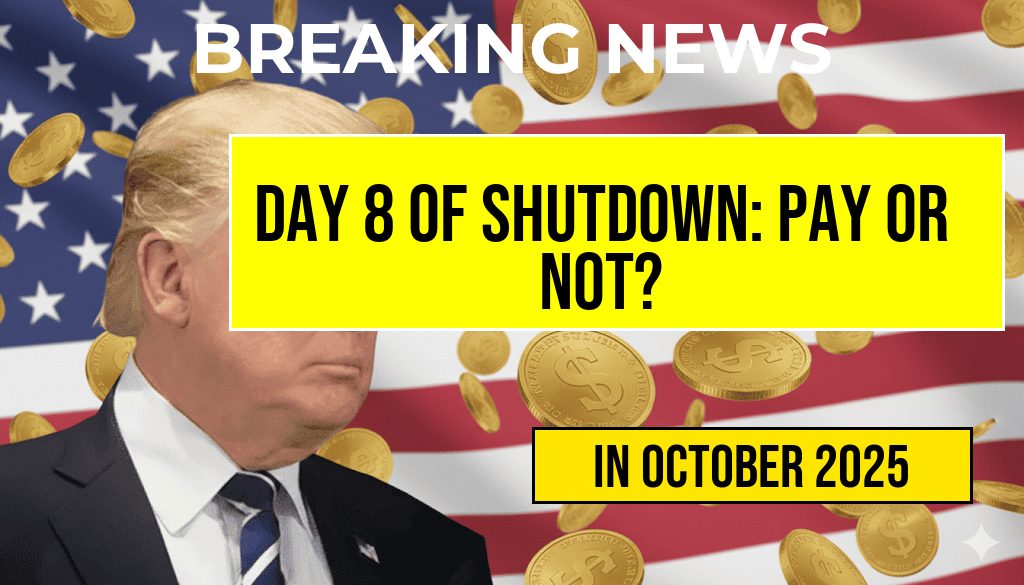As the federal government enters its eighth day of shutdown, thousands of federal workers remain uncertain about their financial stability amid ongoing budget impasses. While some employees have been furloughed without pay, others continue to face the prospect of delayed or partial compensation. The primary question on many minds is whether federal workers will receive their full paychecks or if the shutdown will result in a complete halt to their earnings. With negotiations stalled and political disagreements intensifying, federal employees across agencies such as the Department of Homeland Security, the Treasury, and the Department of Health and Human Services are caught in a financial limbo. This situation not only impacts individual workers but also ripples through local economies and essential government functions, raising concerns about the broader implications of the prolonged funding gap.
What Is Causing the Shutdown and Who Is Affected?
Political Disagreements and Budget Deadlock
The current government shutdown stems from a partisan impasse over federal spending priorities, primarily centered around funding for immigration policies, border security, and pandemic-related programs. Republicans and Democrats remain at odds over key provisions, leading to the inability to pass a continuing resolution or appropriations bills needed to fund federal agencies. As a result, approximately 800,000 federal workers have been furloughed or required to work without pay, depending on their agency’s designation.
Federal Employees in the Crossfire
Federal workers encompass a broad spectrum, including administrative staff, law enforcement officers, health professionals, and contractors. While some are deemed essential and continue working, they often do so without immediate pay, creating financial hardship for many. Conversely, non-essential personnel face furloughs, effectively suspending their income until funding resumes. The impact extends to contractors and vendors dependent on federal contracts, further complicating the economic fallout.
Will Federal Workers Receive Full Pay or Nothing?
Legal Provisions and Historical Precedents
Federal law generally stipulates that employees furloughed during a shutdown do not receive pay until appropriations are restored. However, Congress has occasionally passed measures allowing back pay after the shutdown ends, aiming to mitigate financial hardship. During previous shutdowns, such as those in 2018-2019, federal workers received delayed paychecks, sometimes weeks after the shutdown concluded. As of now, there is no official guarantee that workers will receive full compensation during this current impasse.
Potential for Back Pay
| Shutdown Period | Furloughed Workers Receives Pay | Notes |
|---|---|---|
| December 2018 – January 2019 | Delayed; received after shutdown ended | Congress approved back pay after resolution |
| October 2013 | Delayed; received after shutdown ended | Congress approved back pay for most federal employees |
Lawmakers have historically authorized back pay for affected federal employees once funding is restored. Nonetheless, the delay in receiving wages can cause significant financial strain, especially for those living paycheck to paycheck. Some employees have voiced concern over whether they will be compensated fully or if partial payments will be issued, with the possibility of delayed refunds depending on congressional action.
Impact on Essential Services and Economy
Disruption of Government Functions
The shutdown has led to the suspension of numerous government services, including processing of visas, passport applications, and certain health programs. Agencies such as the Centers for Disease Control and Prevention (CDC) have scaled back activities, affecting public health initiatives. Moreover, the closure of national parks, museums, and other public facilities has affected tourism and local businesses.
Broader Economic Consequences
Economists warn that prolonged shutdowns can slow economic growth, reduce consumer spending, and increase uncertainty in financial markets. Small businesses relying on federal contracts or tourism have reported revenue declines. Additionally, some federal contractors face delays in payments, further aggravating economic instability at the local level.
What Are the Next Steps?
Potential Legislation and Negotiations
Legislators remain engaged in negotiations, with some advocating for temporary funding measures to reopen the government while broader budget issues are addressed. Others push for comprehensive agreements that include policy concessions. The Biden administration has called for a return to regular order in budget processes and urged Congress to prioritize federal workers’ pay and essential services.
Implications for Federal Workers
- Uncertainty about timely paychecks persists amid ongoing negotiations.
- Legislative measures could authorize back pay, but delays are possible.
- Workers are advised to consult official agency communications and financial planning resources.
As the shutdown persists into its second week, the situation remains fluid. Federal workers and their families continue to await clarity on their financial futures, while policymakers grapple with the broader implications of funding disagreements. The resolution of this impasse will significantly influence not only government operations but also the economic well-being of countless Americans depending on federal employment.
Frequently Asked Questions
Will federal workers receive their full pay during the 8th day of the government shutdown?
Currently, federal workers are facing uncertainty regarding full pay. Typically, during a government shutdown, employees may experience delayed or partial payments, but the situation depends on legislative decisions made to address the shutdown.
What are the implications of the government shutdown for federal employees on day 8?
On day 8 of the shutdown, many federal employees are still uncertain about their paychecks. Some may be furloughed with no pay, while others might receive partial or delayed compensation unless Congress intervenes.
Is there any government assistance available to federal workers during the shutdown?
During a government shutdown, federal workers may have limited access to assistance programs or emergency funds. It’s advisable to stay informed through official channels for updates on payroll and benefits.
How long could the government shutdown last, and what does that mean for federal workers?
The duration of a government shutdown depends on legislative negotiations. Longer shutdowns may lead to furloughs and delayed payments for federal workers, increasing financial uncertainty.
What steps can federal employees take to prepare financially during a shutdown?
Federal employees should consider saving emergency funds, reducing unnecessary expenses, and staying updated on legislative developments. Contacting human resources or financial advisors can also provide guidance during these uncertain times.










